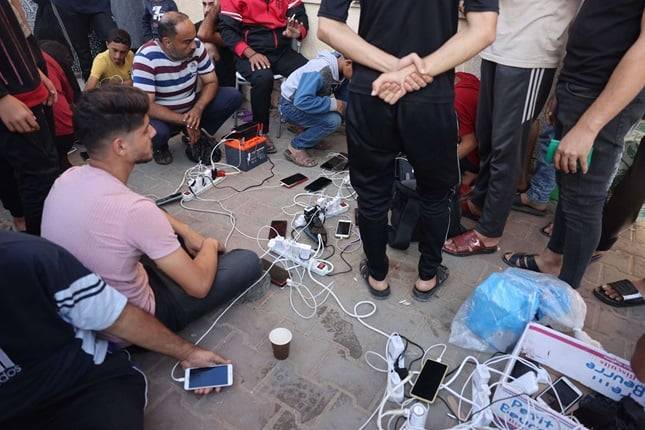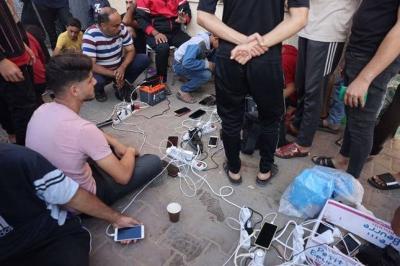Displaced men in Gaza sit around a tangled mass of cables and wires connected to a power outlet in a hospital, striving to achieve a critically important but elusive goal: charging their phones. During wartime in Gaza, a charged phone acts as a lifeline, helping to check on loved ones after Israeli bombings, informing people of places where food and water might be available, and providing light in tents after dark.
Mohammed Abu Sekhta, who fled with his family, including a baby, from the Beach refugee camp in northern Gaza to a tent in Rafah, said, “Today, for a person, the dream is to charge it (the phone) fully, which is very difficult. You might charge it 50-60% at most 70% because you spend three or four hours trying.”
The area available for charging phones outside the Emirates Hospital in Rafah is very popular because it is free. The hospital allows the displaced individuals to connect their cables to electrical sockets powered either by solar panels or generators when fuel is available. In other places, some families or small businesses with solar panels allow people to charge their phones, but often for a fee that not everyone can afford.
Abu Sekhta stated, “Honestly, some people charge with solar power for money, but my financial situation is difficult, so I have to look for another alternative, like charging at a place like the hospital, a free organization without paying money.”
Phones are not the only devices needing regular charging. Mohammed Abu Taha, a barber in Rafah, relies on solar panels at his family's home to charge his electric hair clippers after use. He added, “With every customer, I send my nephew to charge the machine, and I have to tell the customer that if there is sunlight, I will work; if there isn’t, then we won’t be able to work. And if the machine runs out on me, I apologize to them; I can't cut their hair.”
One tailor in Rafah managed to overcome the electricity shortage by turning a disassembled child's bicycle into a pedal dynamo to power his sewing machine.
**No Place to Charge**
The war in Gaza began when Hamas fighters infiltrated southern Israel on October 7th, resulting in the death of 1,200 people and the abduction of 240 hostages, more than 130 of whom are still held, according to Israeli counts. Israel vowed to eliminate Hamas and responded with a siege, bombardment, and a ground invasion of Gaza, leading to the deaths of more than 24,000 Palestinians, according to health officials in Gaza.
Most of the population has been displaced, and the severe shortage of food, water, electricity, and medicine has led to a humanitarian catastrophe, according to the United Nations. Charging a phone has become one of the daily life challenges; it is time-consuming and frustrating, similar to searching for bread or water.
Mahmoud Maakoub, a displaced person from Jabalia in northern Gaza, who brought a battery similar to car batteries to the charging point at the Emirates Hospital, said, “We came here to charge; there’s no room elsewhere.” In addition to phones, people bring such batteries to charge so they can subsequently run the devices they need in their tents.
Volunteers at the hospital organize a schedule that allows individuals to charge for a specific period. This system helps avoid disputes by allowing access to valuable sockets for as many people as possible, but demand is so high that not everyone is satisfied.
Maakoub mentioned he needs to charge his battery to operate medical devices for his children who suffer from respiratory illnesses. He said, "We have kids who rely on the ventilator; we brought them a large battery to connect it because hospitals are full, and the situation is very difficult."
Despite the monotony, they are fortunate enough to find a place to endure while they charge their phones as much as possible. Mohammed Al-Shamali, a displaced person from Gaza City, said, “We come here to the Emirates Hospital to charge our phones; the phone lasts with you one day or a day and a half at most. More than that, it doesn’t last. For lighting only, nothing more.” He added, “Communications are down; there is no Internet network available. You try as much as you can to light up to see the path or the tent where you are sitting, nothing more or less.”




